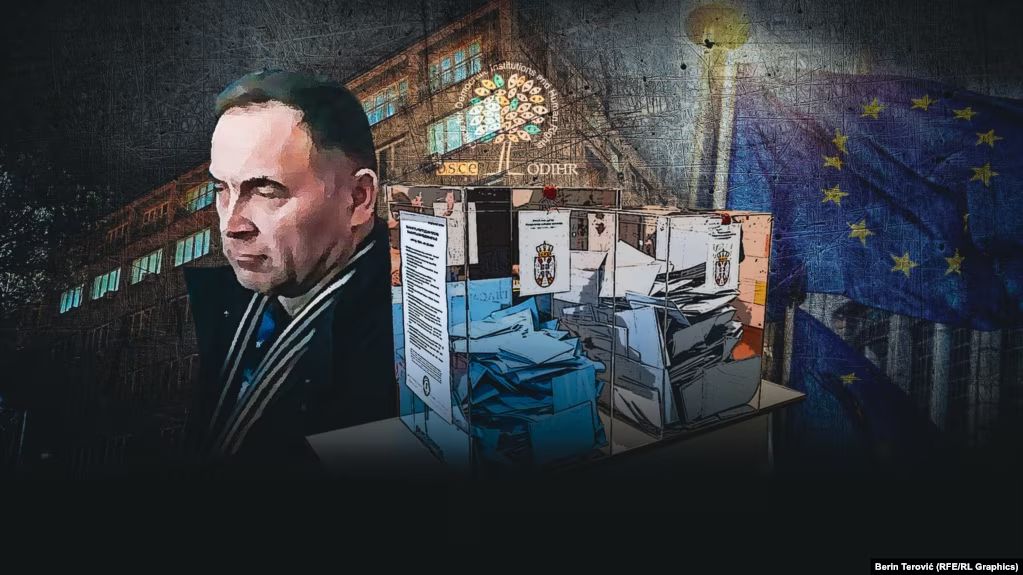A Russian diplomat who was kicked out from Brussels by the EU for espionage, with the explanation that he engaged in illegal and subversive activities, became an observer at the upcoming parliamentary and local elections in Serbia as part of the OSCE mission, the most important security body in Europe. Aleksandr Studenikin, 49, was an adviser at Russia’s Permanent Mission in the EU when, in April 2022, two months into the Russian invasion of Ukraine, he was declared persona non grata along with other 18 Russian diplomats. The EU said they had all been acting against the interests and security of the EU and its member states.
Studenikin is currently part of a group of 30 election observers representing the OSCE in the Serbian elections to parliament and 65 municipal councils. Previously, some media outlets reported that Studenikin was a Russian Foreign Intelligence Service (SVR) operatives, but he still became one of four Russians on the list of long-term observers in the mission of the OSCE Office for Democratic Institutions and Human Rights (ODIHR). These observers are responsible for monitoring the entire election process, that is, for gathering information and deeper understanding of the general administrative procedures and circumstances of the election campaign. The group also includes observers from the United States, United Kingdom, Germany, France, Denmark, Belarus, and seven other countries. Studenikin’s appointment is temporary, but there are several indications that Serbia has become a frequent destination for Russian diplomats expelled from the EU.
At least three Russian diplomats linked to Russian intelligence agencies and blacklisted by EU member states continued their career paths as Russian diplomats accredited in Serbia. Serbia is one of the few European countries that never imposed sanctions on Russia over the invasion of Ukraine. The expulsion of Russian diplomats came after EU governments blacklisted hundreds of members of the Russian diplomatic corps following Russia’s invasion of Ukraine in February 2022, with several EU member states citing espionage as grounds for the expulsion. The elections in Serbia are taking place against the backdrop of increased pressure from Western democracies on Serbia to impose sanctions on Russia. The ruling Serbian Progressive Party and Serbian President Aleksandar Vučić remain in a coalition with parties considered pro-Russian. Aleksandar Vučić has repeatedly stressed that he is in favour of joining the EU, while maintaining friendly ties with Russia, which has supported Serbia in several disputes with the West in the past. Russians working in the OSCE have already had problems entering some EU countries. Last year, the Polish authorities declared two Russian employees of the OSCE Parliamentary Assembly personae non grata, explaining that they pose a “threat to state security.” Daria Boyarska, a Russian employee at the OSCE, was detained at the Lithuanian-Russian border while trying to cross into Kaliningrad.
OSCE member states are responsible for selecting individuals who wish to join an election observation mission, so the OSCE does not directly manage the hiring process. Studenikin, who works for the Organization for the Prohibition of Chemical Weapons (OPCW) in The Hague, arrived in Serbia on November 19 to start his mission as an OSCE election observer. Studenikin’s monitoring group is responsible for several municipalities in eastern Serbia, and he has already met with local political representatives in Zajecar and Kladovo, near the borders with Bulgaria and Romania. He was present at campaign events organized by both the ruling and opposition parties in the Zajecar region. Studenikin said that the reason for him being expelled from the observers list was information from his public account on LinkedIn, where it is indicated that he works for the Organization for the Prohibition of Chemical Weapons.
“About 500 Russian citizens were expelled from Europe. It turned out that if you are Russian, you are also a spy. Whether you are a diplomat or not, it doesn’t matter,” Studenikin told RFE/RL. ODIHR spokeswoman Katya Andrusz reported that the organization had not been aware that the EU had declared Studenikin persona non grata. Election observers are elected by their countries and shall adhere to the observer code of conduct, she added. Any serious violation of the code will lead to the immediate withdrawal of the observer’s accreditation, Andrusz noted. Radio Free Europe sent inquiries about Studenikin’s role as an election observer to the Ministry of Foreign Affairs of Serbia, the Election Commission of Serbia, and the Permanent Mission of Russia to the OSCE in Vienna, but received no response.
Studenikin was blacklisted by the EU in April 2022, after the results of a joint investigation by EU Observer and the Dossier Center research group were first published. EU Observer stated that Studenikin works for SVR, although Studenikin himself denied this. “Maybe I would like to work for someone like that, but so far in my career that opportunity has not arisen. Therefore, no, definitely not,” he told RFE/RL. In response to RFE/RL’s inquiry about Studenikin, SVR in a brief email declined to comment on the allegations. The EU did not release the exact names of the 19 blacklisted Russian diplomats or directly charge them with espionage, but said they engaged in “activities contrary to their diplomatic status”. The European Union responds to the illegal and subversive actions of the appointed members of the Russian mission, which are contrary to the interests and security of the EU and its member states, the EU statement said.
Thus, we can state Moscow’s heightened interest in the outcome of Serbia’s elections. Russia in Belgrade has long been engaged with both the ruling and opposition parties. The Kremlin believes that whoever wins the elections, Moscow will continue to have a decisive influence on the course of political events in Serbia. Given that Belgrade, unlike Western capitals, has not expelled a single Russian diplomat for espionage, it can be assumed that Russian intelligence assets have deeply infiltrated the ruling political and business elite. Moscow also does not forget to act actively among opposition leaders, so analysts predict that even if the opposition wins, Belgrade will pursue its pro-Russian policy. Studenikin’s response claiming he is not an SVR operative does not seem strange. It is common practice for Russian operatives to deny involvement with the SVR. But Studenikin went further. When refuting the allegation, he even stated that he would not mind being an SVR agent but, unfortunately, he is not. The audacity just gives him away as a special agent as this is precisely a signature move by the SVR. Moscow has already formed and nominated for the Serbian elections the Russian Party, the defender of the Kremlin’s interests. All that remains is to replace the president of Serbia with an actual Russian and then the Kremlin will celebrate its triumph…



